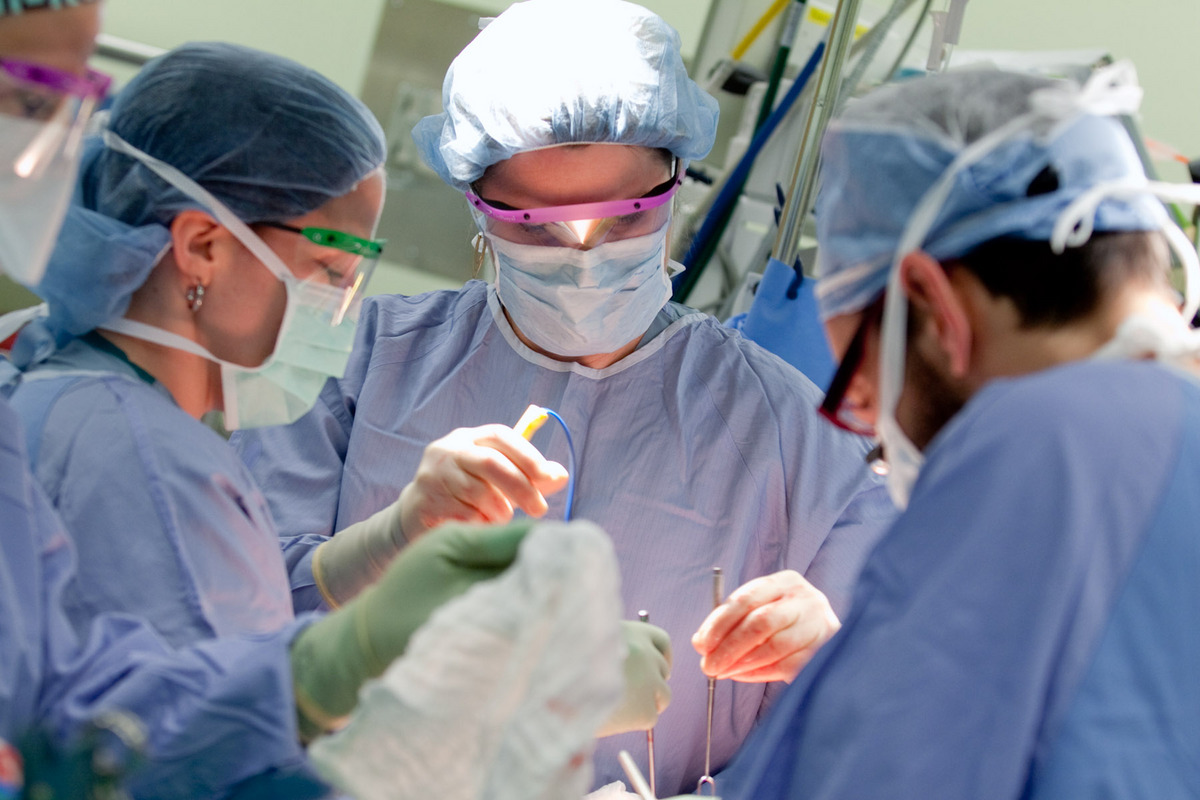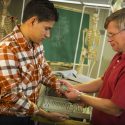GlovesOn program trains Wisconsin surgeons in latest operating techniques

Lee Wilke, MD, FACS, center, is one of several UW surgeons who have hosted surgeons from other hospitals throughout the state and region through the UW Department of Surgery’s GlovesOn program. Photo courtesy UW–Madison Department of Surgery
An innovative surgical training program at the University of Wisconsin–Madison recently hosted its 125th participant, making it one of the nation’s most active surgical training programs for practicing surgeons — and the only program of its kind in the state.
In 2011, the University of Wisconsin–Madison Department of Surgery first opened its operating rooms to practicing surgeons from across the state and nation, giving them the opportunity to learn advanced surgical skills and acquire hands-on training for new procedures. The GlovesOn program has since attracted surgeons from more than 15 Wisconsin counties and six states.
Kristen Wells, MD, FACS, has been a rural surgeon in Baraboo, Wisconsin, for 13 years. She has scrubbed in with UW surgeons through the GlovesOn program three times, in the areas of colorectal surgery, trauma/acute care services and breast tumor removal. Wells says GlovesOn offers her an effective avenue to expand her surgical knowledge base.
“I’ve found reading about surgery and listening to someone talk about surgery isn’t the greatest way to learn surgery,” Wells says. “The best way to learn is from other surgeons in the operating room. That’s what GlovesOn allows me to do.”
Surgical education typically consists of a four-year medical school program, five years of surgical residency and a one- or two-year surgical fellowship in a specialized area. The GlovesOn program gives practicing surgeons, at any point in their careers, the opportunity to continue hands-on training. GlovesOn participants identify a procedure in which they would like to gain skills, and then UW surgery staff coordinates that individual’s participation in the operating room with one of the UW surgeons. Vascular operations are especially popular, as are heart and lung procedures and minimally invasive general surgery.
“The University of Wisconsin is the epicenter for education for the state of Wisconsin and beyond with many of its programs having national penetration,” says Dr. K. Craig Kent, professor of surgery and chair of the University of Wisconsin’s Department of Surgery. “Our department has embraced this role with the development of educational programs aimed at keeping surgeons up to date with the latest in clinical care.”
As a rural surgeon, Wells performs a wide range of surgical procedures. That’s in contrast to the surgeons at UW–Madison, who typically specialize in specific areas of surgery. “It’s challenging to keep up on all the areas of surgery I perform. This program allows me to stay fresh,” Wells says. “It has allowed me to observe surgical specialists and see how they perform surgeries.”
Those observations have helped Wells pick up valuable skills she has since incorporated into her surgical technique. “Being a surgeon is like being in the NBA — we are all highly skilled,” she says. “But how do you become a Michael Jordan? You need someone to give you pointers and feedback, someone who can help you move from proficient to excellent.”
The Department of Surgery is part of the University of Wisconsin School of Medicine and Public Health, located within the University of Wisconsin–Madison campus and affiliated with the University of Wisconsin Hospital and Clinics. The department, which is ranked sixth in the country for its research efforts, is home to more than 90 active surgeons who also help educate medical students and future surgeons. In recent years, the department has expanded its mission even further to become an educational resource for medical professionals throughout the state and region.
The UW–Madison GlovesOn program is one of few programs of its kind in the nation and is the only one in Wisconsin. It’s open to any surgeon.
Rebecca Wasieleski
Subscribe to Wisconsin Ideas
Want more stories of the Wisconsin Idea in action? Sign-up for our monthly e-newsletter highlighting how Badgers are taking their education and research beyond the boundaries of the classroom to improve lives.


